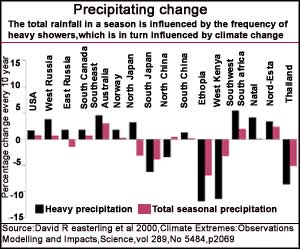Where water flows21
Researchers at the University of Toronto, Canada have been able to predict rises in sea level attributed to global warming. Usually global warming models predict that the poles will warm up quickly,
Researchers at the University of Toronto, Canada have been able to predict rises in sea level attributed to global warming. Usually global warming models predict that the poles will warm up quickly,
The International conference on Climate Change Innovation and Resilience for Sustainable Livelihood is going to be held on 12-14 January in Kathmandu, Nepal.The conference will focus on innovative approaches
Stay order: A division bench of the Gujarat High Court (HC), comprising chief justice Bhawani Singh and justice H K Rathod, recently passed an order that prevents the state's forest and revenue
For climate change, this is time of urgency, big ideas, and hope. 2015 will be a year of decisions – in Paris at the 21st Conference of Parties to the United Nations Framework Convention on Climate Change
The Department of Ecology and Environmental Sciences of Pondicherry University, in association with the Indian-European Multi-level Climate Governance Research Network (IECGN), will be organizing the International

A review of climate studies projects what s in store: colder winters, hotter summers, drought, storms and lots worse
The report underscores the need for strong public policies to help realize the potential of industrial biotech and recommends initiatives such as pollution costs charged to petrol-based materials, investment in advanced waste management technologies, and labeling systems for bio-based products.
Aerosols from Asia are poisoning the environs of the Pacific Ocean, say researchers
Researchers create a near replica of the Hepatitis C virus
At Brazil's main airports leaflets will be distributed warning passengers of the danger of contracting potentially fatal blood clots on long-haul flights. The threat of suffering deep-vein thrombosis

Ireland is facing the wrath of the European Commission (ec), the eu executive, on many environmental issues. On April 11, 2005, the ec announced that following complaints of bad smells from

Controversy and genetically modified (gm) foods are inseparable. Science journal Nature reported on March 23, 2005 that biotech firm Syngenta International ag had inadvertently distributed an
A ngola is in the grip of the worst recorded outbreak of the rare Marburg disease. By March 31, 2005, 130 people, three fourths of them children, had died and the country's four provinces affected.
Global warming has led to the early rejuvenation of vegetation in spring, a phenomenon that is causing a change in the annual carbon dioxide cycle. The northern hemisphere in particular, welcomes spring earlier now
US President George Bush played host to a party of the top polluters of the world called to discuss climate change. He exhorted his guests that the world needed to act and called for a new approach

High carbon dioxide levels may bring about some unpleasant surprises
<p>The consumption and emissions of hydrofluorocarbons (HFCs) are projected to increase substantially in the coming decades in response to regulation of ozone depleting gases under the Montreal Protocol.
Energy efficiency, many types of renewable energy, carbon capture and storage, nuclear power and new transport technologies all need to be deployed widely to curtail greenhouse gas emissions (GHG) while promoting energy security. Every major country and sector of the economy must be involved.

In a surprise move, the Australian government, which vociferously opposes whaling at all international fora, has decided to not support a lawsuit filed by an Australian animal rights group against a
The United Nations took a step towards a new climate treaty on 15th May by publishing the first draft negotiating texts to help bridge a "great gulf" between options for rich nations to cut greenhouse gas emissions.